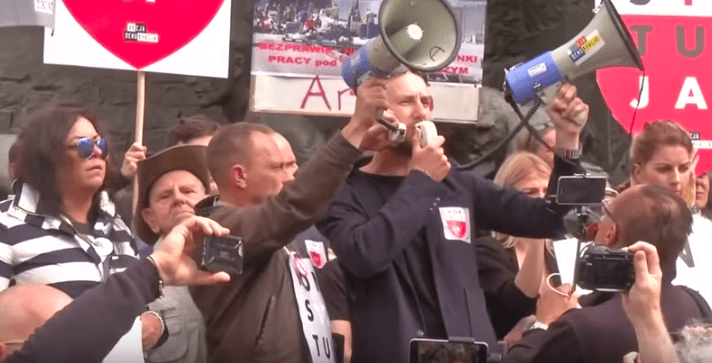Poland’s Supreme Court Justices Defy Government Purge
The right-wing Law and Justice Party is attempting to force justices to retire early, raising concerns that it wants to stifle judicial independence. Protesters outside the Polish Supreme Court building in Warsaw, Poland. (Screenshot / YouTube).
Protesters outside the Polish Supreme Court building in Warsaw, Poland. (Screenshot / YouTube).
From Denmark to Italy, far-right governments have gained power in Europe. The trend has also spread to Poland, where on Tuesday leaders of the Law and Justice Party ordered a purge of the country’s Supreme Court. Tens of thousands of Poles took to the streets in protest. Now, as NPR reported Wednesday, multiple judges are defying the purge, posing a stark challenge to the government.
The purge was spurred by new rules that lower the mandatory retirement age of Supreme Court justices from 70 to 65, forcing the retirements of 27 of the 72 judges in the country’s highest judicial chamber.
The government defended its decision, claiming that “the forced retirements are aimed at fighting corruption and improving judicial efficiency,” as NPR’s Soraya Sarhaddi Nelson reported Wednesday. Mateusz Morawiecki, Poland’s prime minister, also defended the rule to the European Parliament, saying, “Every EU country has the right to develop its judicial system according to its own traditions,” the BBC reported.
Protesters believe the rule is part of the Polish government’s attempt to stifle judicial independence. “We are here because of the destruction of the judiciary in Poland,” Kamila Wrzesinska, one of the demonstrators, told The New York Times.
The Law and Justice Party, the Times observes, has been laying the groundwork for the purge since it came to power in 2015. It took control of the country’s constitutional tribunal and ministry of justice, arming itself with new powers to choose judges, and harassing judges who dare to challenge it. The party gained votes partly based on a nationalist message, telling voters it was time for Poland to “get up from its knees.”
The slogan, the Times says, “found widespread appeal in villages and towns, especially in eastern Poland, where many people felt left behind as the country moved rapidly to embrace Western values and capitalism.”
What the Law and Justice Party did not prepare for, as NPR reported, was Malgorzata Gersdorf, head of Poland’s Supreme Court. She disobeyed the order, coming to work Wednesday morning and telling assembled protesters and reporters, “I want to show that the constitution and the violation of the constitution are two different things.”
Gersdorf has assistance from an unlikely source: the judge appointed to replace her. As the Times reports:
In a reflection of the chaos, the jurist named by the government as Justice Gersdorf’s successor, Justice Jozef Iwulski, 66, said: “President Andrzej Duda neither appointed me, nor did he entrust any duties to me. He didn’t make any decision in a concrete manner.”
In fact, it was Justice Gersdorf who had recommended that Justice Iwulski fill in for her—a move experts thought would make it harder for the party in power to stack the court.
According to the BBC, 10 other judges followed Gersdorf’s lead. The protest also attracted multiple leaders from Poland’s past, including former President Lech Walesa, a leader in the Solidarity movement that toppled the country’s Communist government, and Adam Strzembosz, who was instrumental in creating Poland’s constitution and was the first president of the Supreme Court after communism.
As of Thursday morning, there was no resolution in sight. In fact, The Associated Press reported, there was more rebellion: Judges in the constitutional tribunal wrote to their principal judge, saying she had kept important cases from them and prevented them from doing their jobs.
Your support matters…Independent journalism is under threat and overshadowed by heavily funded mainstream media.
You can help level the playing field. Become a member.
Your tax-deductible contribution keeps us digging beneath the headlines to give you thought-provoking, investigative reporting and analysis that unearths what's really happening- without compromise.
Give today to support our courageous, independent journalists.


You need to be a supporter to comment.
There are currently no responses to this article.
Be the first to respond.